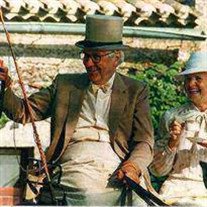





Obituary
Obituary of John Martin Seabrook
Please share a memory of John to include in a keepsake book for family and friends.
Funeral Services for John Martin Seabrook will be held on Saturday, February 14, 2009 at 11:00am at George Funeral Home & Cremation Center, 211 Park Ave. SW Aiken, SC with Dr. Rev. David Cozad officiating. The family will receive friends at the funeral home from 10:00am until the time of the service. Interment services will take place on Tuesday, February 17, 2009 at 11:00am at Deerfield Presbyterian Church and Cemetery, Upper Deerfield Twp., NJ. Memorial donations may be directed to the Hitchcock Woods Foundation, PO Box 1702, Aiken, SC 29802 or to Woodland Country Day School, 1216 Roadstown Rd. Bridgeton, NJ 08302.
John Martin Seabrook, a New Jersey farm boy who became a corporate titan, influential sportsman, and international icon of Saville Row style, died at his home in Aiken, South Carolina, on February 11. He was ninety-one.
Mr. Seabrook was born on April 16, 1917, in Bridgeton, N.J, the youngest of four children. He worked in the vegetable fields of his family farm from the age of nine. His father, Charles F. Seabrook, and grandfather built a small Cumberland County farm into Seabrook Farms, one of the largest industrialized farms in the world, with interests in growing, canning and eventually freezing vegetables. As a boy Seabrook weeded onions, sorted flower bulbs in the farm's greenhouses, and applied his early fascination with chemistry to soil testing and plant cultivation.
Mr. Seabrook graduated summa cum laude with a degree in chemical engineering from Princeton University in l939; he remained an ardent supporter of his alma mater for the rest of his life. Upon graduating, he went to work at Seabrook Farms, becoming president in l954 and building the company into one of the world's largest producer of frozen vegetables and prepared meals. Under his leadership, Seabrook Farms developed the boil in the pouch method of cooking its popular frozen creamed spinach, as well as pioneering frozen entrees that would become known as "TV dinners." He also served for many years on New Jersey's Migrant Labor Board, working to improve the working and living conditions of the state's seasonal agricultural workers. By 1959, some 25, 000 acres of South Jersey farmland were either owned or leased by the company. That same year, Mr. Seabrook had a falling out with his father, who maintained the controlling interest in the stock. His father sold the company, and Seabrook resigned. He said that no crisis in his later business career came close to the trauma of losing the family business.
Mr. Seabrook soon regained his footing, however, becoming by the mid-1960's the chief executive of I.U. International, a utilities company headquartered in Philadelphia. As a leader in the business climate of the l960's that favored conglomeration, Mr. Seabrook built I.U. into a global corporation with interests in energy, mining, shipping, transportation, and food products.
Mr. Seabrook's first marriage, to Anne Schlaudecker of Erie, Pa. ended in divorce. In the mid-1950's, he had a romance with the actress Eva Gabor, a frequent visitor to Seabrook Farms, who later used some of those experiences in her role as the cosmopolitan wife of a farmer, played by Eddie Albert, in Green Acres, the popular television series. He was also a regular at "21" and the Stork Club, in New York City. However in 1956, he bid farewell to his bachelor days by marrying Elizabeth Ann Toomey, a newspaper reporter whom he had met earlier that year, while aboard the US Constitution, en route to Grace Kelly's wedding to Prince Rainer of Monaco. Seabrook was a guest of the Kelly family; his future bride was covering the wedding for United Press International.
By the early 1960's, when Esquire Magazine first named him to its Best Dressed Men in American list, Mr. Seabrook was recognized as one of the country's most stylish devotees of the British Saville Row look. To accommodate his wardrobe, he installed a revolving dry cleaner's carousel in the attic of the 18th century farmhouse in Salem, New Jersey, where he and his family lived. An enthusiastic equestrian, Seabrook was equal parts horseman and clotheshorse. When Diana Vreeland produced the exhibit "Man and The Horse" for Metropolitan Museum's Costume Institute, in 1985, she asked him to provide clothing accessories appropriate to 19th century England -- outfits that he was still wearing on a regular basis.
Mr. Seabrook had begun collecting and driving l9th century carriages when the sporting world had almost forgotten about carriage driving, and he was instrumental in reviving the sport of "coaching" in the U.S. He was a founding member of the Carriage Association of America, and the third American member of the British Coaching Club, following William Tiffany and Alfred Vanderbilt. He often conducted business from the box seat of a road coach. Richard Fain, who as a young executive worked under Seabrook at I.U, and later became the CEO of Royal Caribbean Cruise Line, recalled, "He would be holding four reins in one hand, a coaching whip and champagne glass in the other, driving four horses through farm roads lined with vegetables, remarking on the state of the crops, while simultaneously discussing how best to finance the five new supertankers the company was getting ready to order. Of course, the board of directors was along for the ride, both literally and figuratively." In his later years, his horses and carriages became a familiar presence in Newport, Rhode Island, for the annual summer meeting of the American Coaching Club.
After retiring from I.U. In 1981, Mr. Seabrook shifted his energies to Gotass Larsen Shipping Corporation successfully spinning off Royal Caribbean as a separate entity. He also continued as a director of Bell Atlantic now Verizon, retiring in 1989 after 34 years, the longest tenure as a director of the "Baby Bells". He and his wife began to spend more time in Aiken, South Carolina, where he pursued his interest in coaching and lent his time to preserving the Hitchcock Woods, a 2, 000-acre urban park in the middle of Aiken. They moved there permanently in 2000; Mrs. Seabrook died in 2005.
Mr. Seabrook maintained a lifelong interest in New Jersey's agricultural heritage, and served as an informal advisor to the state's longtime secretary of agricultural, Art Brown. The last great enterprise of his life was devoted to ensuring that the nearly 2000 acres he still owned in New Jersey would be preserved as farmland in perpetuity. In November 2008, Charles Kuperus, New Jersey's Agriculture Secretary, announced the state's purchase of the development rights -- the largest preservation deal in New Jersey history -- saying, "This truly is a once-in-a-lifetime opportunity to be able to preserve such a sizable portion of South Jersey's agricultural land base."
Mr. Seabrook is survived by his four children - Carol Boulanger, Lizanne Brooke, and John Seabrook, Jr., all of Manhattan, and Bruce Seabrook, of Miami, Florida - and by five grandchildren; Rudolphe Boulanger, Adriana Boulanger, Harry Seabrook, Maggie Seabrook and Ginger Seabrook
Our Location
211 Park Avenue, SW
Aiken, SC
29801
(803) 649-6234
Fax (803) 648-6150
info@georgefuneralhomes.com

